The Maxim Film production Arme Thea/Poor Thea (Carl Froelich, 1919) was a star vehicle for German actress Lotte Neumann. It was the first film in the 'Lotte Neumann-Serie'. Besides being one of the most successful actresses of the early German silent cinema, she also worked as screenwriter and producer. Ross Verlag produced a series of six sepia postcards with film scenes.
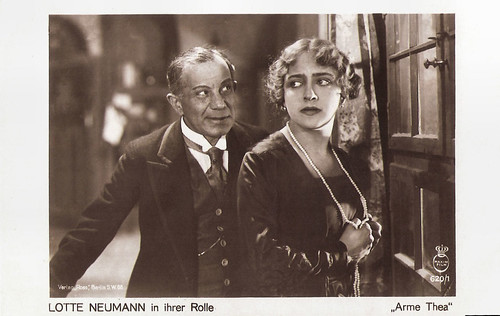
German postcard by Ross Verlag, no. 620/1. Photo: Maxim Film. Publicity still for Arme Thea/Poor Thea (Carl Froelich, 1919) with Lotte Neumann.
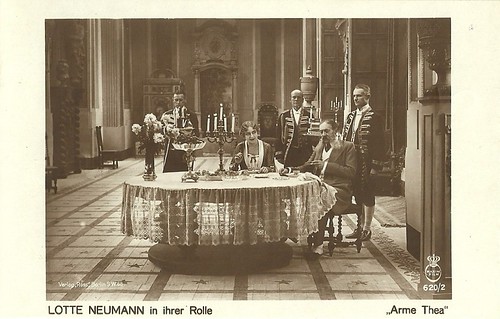
German postcard by Ross Verlag, no. 620/2. Photo: Maxim Film. Publicity still for Arme Thea/Poor Thea (Carl Froelich, 1919) with Lotte Neumann and Adolf Klein.
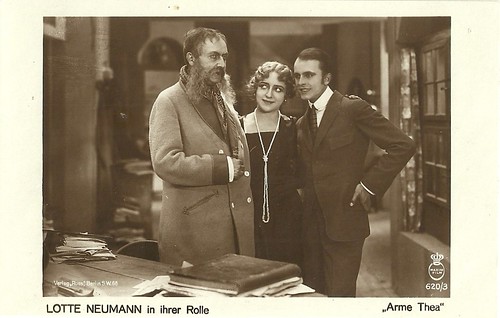
German postcard by Ross Verlag, no. 620/3. Photo: Maxim Film. Publicity still for Arme Thea/Poor Thea (Carl Froelich, 1919) with Adolf Klein, Lotte Neumann and Ernst Hofmann.
Lotte Neumann plays in Arme Thea/Poor Thea (Carl Froelich, 1919) Thea von Hoffäcker, daughter of a chamberlain, Freiherr von Hoffäcker (Adolf Klein).
Georg Textor (Ernst Hofmann), man about town and son of a well-to-do merchant, is betrothed to Thea. When one day Georg flunks at the races, and his future father-in-law bets on the wrong horse, Textor’s one namely, the situation is alarming. Hoffäcker, suddenly very short of cash, wants to borrow 50,000 Mark from his friend Raschdorf.
The promised money-sum does not arrive fast enough with the chamberlain, whose creditors are already on his neck. Hoping that the 50,000 marks arrive shortly, Hoffäcker writes a check secured by Raschdorf. But when Raschdorf suddenly dies of a stroke, Hoffäcker’s world collapses. His aristocratic relatives advise him to shoot himself, as is common in their milieu, but the man refuses and instead serves a one-year sentence for bribery in prison.
Poor Thea, unknown to what has fallen upon her father, is said he is on a secret diplomatic mission to the Far East. After one year Hoffäcker is released and with his former bookmaker Heinlein (Guido Herzfeld) he finds a small job at the editorial office of Turflaterne, a second rate racing track magazine.
Thea learns that her father has returned from his 'diplomatic mission' to Berlin. Immediately she visits him in his new, humble domicile. Nothing has remained of the proud representative of the upper-class official caste. Thea cannot explain the outer decay of her father and does not get any response from him.
Georg doesn’t know any more. He has just returned home from a trip to Mexico, where he tried - unsuccessfully - to initiate rescue measures for the family company that had been in a state of misery. Textor is now also broke, and as luck would have it, he also lands with Heinlein and his shabby magazine. Georg meets his future sister-in-law, learns of Hoffäcker's descent, and makes it clear to him that he does not intend to marry the daughter of a bailout.
However, Georg quickly regrets his harsh words and wants to apologise to Thea and her father. But Hoffäcker has finally followed his blue-blooded 'advice' and has shot himself. The guilt has now been eradicated, so Georg asks Thea to marry him.
Arme Thea/Poor Thea (Carl Froelich, 1919) was based on a novel by Rudolph Stratz. The sets were designed by Hans Sohnle. The film premiered in August 1919 at the Berlin cinema Kammerlichtspielen. Jupp Wiertz designed an elegant poster for the film.
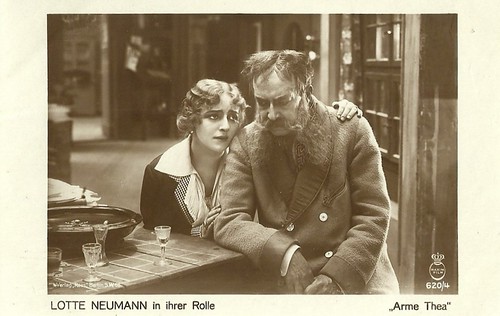
German postcard by Ross Verlag, no. 620/4. Photo: Maxim Film. Publicity still for Arme Thea/Poor Thea (Carl Froelich, 1919) with Lotte Neumann and Adolf Klein.
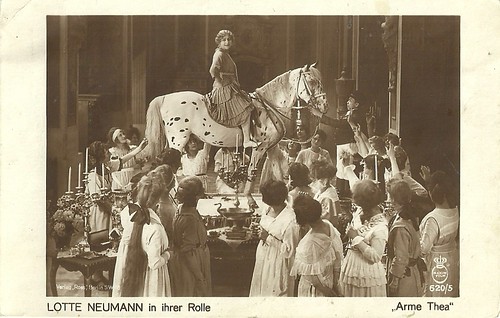
German postcard by Ross Verlag, no. 620/5. Photo: Maxim Film. Publicity still for Arme Thea/Poor Thea (Carl Froelich, 1919) with Lotte Neumann.
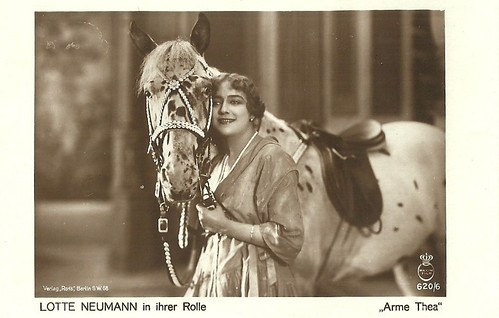
German postcard by Ross Verlag, no. 620/6. Photo: Maxim Film. Publicity still for Arme Thea/Poor Thea (Carl Froelich, 1919) with Lotte Neumann.
Source: The German Early Cinema Database, Wikipedia (German) and IMDb.

German postcard by Ross Verlag, no. 620/1. Photo: Maxim Film. Publicity still for Arme Thea/Poor Thea (Carl Froelich, 1919) with Lotte Neumann.

German postcard by Ross Verlag, no. 620/2. Photo: Maxim Film. Publicity still for Arme Thea/Poor Thea (Carl Froelich, 1919) with Lotte Neumann and Adolf Klein.

German postcard by Ross Verlag, no. 620/3. Photo: Maxim Film. Publicity still for Arme Thea/Poor Thea (Carl Froelich, 1919) with Adolf Klein, Lotte Neumann and Ernst Hofmann.
The daughter of a bailout
Lotte Neumann plays in Arme Thea/Poor Thea (Carl Froelich, 1919) Thea von Hoffäcker, daughter of a chamberlain, Freiherr von Hoffäcker (Adolf Klein).
Georg Textor (Ernst Hofmann), man about town and son of a well-to-do merchant, is betrothed to Thea. When one day Georg flunks at the races, and his future father-in-law bets on the wrong horse, Textor’s one namely, the situation is alarming. Hoffäcker, suddenly very short of cash, wants to borrow 50,000 Mark from his friend Raschdorf.
The promised money-sum does not arrive fast enough with the chamberlain, whose creditors are already on his neck. Hoping that the 50,000 marks arrive shortly, Hoffäcker writes a check secured by Raschdorf. But when Raschdorf suddenly dies of a stroke, Hoffäcker’s world collapses. His aristocratic relatives advise him to shoot himself, as is common in their milieu, but the man refuses and instead serves a one-year sentence for bribery in prison.
Poor Thea, unknown to what has fallen upon her father, is said he is on a secret diplomatic mission to the Far East. After one year Hoffäcker is released and with his former bookmaker Heinlein (Guido Herzfeld) he finds a small job at the editorial office of Turflaterne, a second rate racing track magazine.
Thea learns that her father has returned from his 'diplomatic mission' to Berlin. Immediately she visits him in his new, humble domicile. Nothing has remained of the proud representative of the upper-class official caste. Thea cannot explain the outer decay of her father and does not get any response from him.
Georg doesn’t know any more. He has just returned home from a trip to Mexico, where he tried - unsuccessfully - to initiate rescue measures for the family company that had been in a state of misery. Textor is now also broke, and as luck would have it, he also lands with Heinlein and his shabby magazine. Georg meets his future sister-in-law, learns of Hoffäcker's descent, and makes it clear to him that he does not intend to marry the daughter of a bailout.
However, Georg quickly regrets his harsh words and wants to apologise to Thea and her father. But Hoffäcker has finally followed his blue-blooded 'advice' and has shot himself. The guilt has now been eradicated, so Georg asks Thea to marry him.
Arme Thea/Poor Thea (Carl Froelich, 1919) was based on a novel by Rudolph Stratz. The sets were designed by Hans Sohnle. The film premiered in August 1919 at the Berlin cinema Kammerlichtspielen. Jupp Wiertz designed an elegant poster for the film.

German postcard by Ross Verlag, no. 620/4. Photo: Maxim Film. Publicity still for Arme Thea/Poor Thea (Carl Froelich, 1919) with Lotte Neumann and Adolf Klein.

German postcard by Ross Verlag, no. 620/5. Photo: Maxim Film. Publicity still for Arme Thea/Poor Thea (Carl Froelich, 1919) with Lotte Neumann.

German postcard by Ross Verlag, no. 620/6. Photo: Maxim Film. Publicity still for Arme Thea/Poor Thea (Carl Froelich, 1919) with Lotte Neumann.
Source: The German Early Cinema Database, Wikipedia (German) and IMDb.
No comments:
Post a Comment